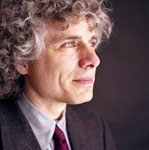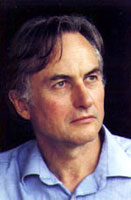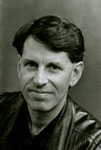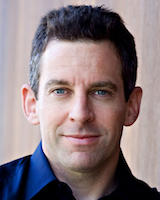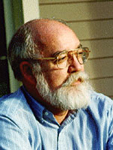So, on the issue of mainstream monotheistic religions and the irrationality behind many of religion's core tenets, scientists often set aside their skewers, their snark, and their impatient demand for proof, and instead don the calming cardigan of a a kiddie-show host on public television. They reassure the public that religion and science are not at odds with one another, but rather that they represent separate "magisteria," in the words of the formerly alive and even more formerly scrappy Stephen Jay Gould. Nobody is going to ask people to give up their faith, their belief in an everlasting soul accompanied by an immortal memory of every soccer game their kids won, every moment they spent playing fetch with the dog. Nobody is going to mock you for your religious beliefs. Well, we might if you base your life decisions on the advice of a Ouija board; but if you want to believe that someday you'll be seated at a celestial banquet with your long-dead father to your right and Jane Austen to your left-and that she'll want to talk to you for another hundred million years or more—that's your private reliquary, and we're not here to jimmy the lock.

INTRODUCTION
by John Brockman
In a talk in London a few months ago, Ian McEwan noted that looking back at the mid-70s, "none of us ...would have thought [that] we'd be devoting so much mental space now to confront religion. We thought that matter had long been closed." Indeed, earlier this year sixteen scientists, all Edge contributors, dropped everything to write authoritative essays for a book published on a crash schedule to rebut the hoax known as "Intelligent Design". One of the most perceptive comments about the book, Intelligent Thought: Science versus the Intelligent Design Movement, was in an Orlando Weekly review:
The worst kind of argument to have, is one with someone who Just Doesn't Get It. The debates that find your well-reasoned points countered with the tautological equivalent of "nuh-uh" or "because, that's why" may not make you feel like you lost the argument, but you certainly don't feel like you won, either. Especially when the topic you're disagreeing on isn't even something that should be up for debate. ...
That's the overriding sense one suspects the writers of the essays in Intelligent Thought were experiencing when they put pen to paper. More than one of them, I'm sure, muttered to himself: "I can't fucking believe I'm having to write this".
("Science vs. Stupid" by Jason Ferguson)
We did not spend the time and take the trouble to publish the book to convert religious fundamentalists to science-based thinking, but simply to have a place marker to sit on the desks of educators, of newspaper and magazine editors, of politicians, which could, at a minimum, serve as a talisman for rational thinking and ideas. In a nation where, during a single week, the President of the United States, the Majority Leader of the Senate, the leading candidate (Senator John McCain) for the Republican nominee for the presidential election in 2008, all endorsed teaching Christian fundamentalist religious dogma in public school science classes, business as usual is off the table.
And now, more than ever, it's time for extreme voices.
Natalie Angier, the Pulitzer prize-winning New York Times science journalist understands this. It was her ringing endorsement of atheism in her widely discussed 2004 review of Sam Harris's first book, The End of Faith, in The New York Times Book Review (see "'The End of Faith': Against Toleration") that, in part, set the stage for the current conversation about the recent books of Daniel C. Dennett, Richard Dawkins, and Sam Harris. This resulted in something unthinkable just a few years ago: the two leading national news magazines, Time and Newsweek, both running cover stories during the same week presenting the ideas of leading atheists to the American reading public.
"There is something to be said for a revival of pagan peevishness and outspokenness," Angier wrote in 2001. "It's not that I would presume to do something as foolish and insulting as try to convert a believer. Arguments over the question of whether God exists are ancient, recurring, sometimes stimulating but more often tedious. Arrogance and righteousness are nondenominational vices that entice the churched and unchurched alike. ... Still, the current climate of religiosity can be stifling to nonbelievers, and it helps now and then to cry foul. "
Read on.
— JB
NATALIE ANGIER won the Pulitzer Prize for beat reporting as a science writer for The New York Times. She is the author of Natural Obsessions,The Beauty of the Beastly, Woman: An Intimate Geography, and the forthcoming The Canon: A Whirligig Tour of the Beautiful Basics of Science.
Natalie Angier's Edge Bio Page

